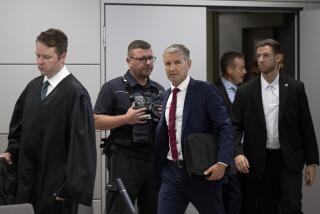Germany Fines Kohl’s Party Over $20 Million
- Share via
BERLIN — In what may be only the first of many financial blows to the teetering Christian Democratic Union, Germany’s parliamentary president demanded Tuesday that the party of former Chancellor Helmut Kohl return more than $20 million of state matching funds.
The penalty, the most costly ever levied on a German party for financial misdeeds, was determined solely on the basis of the CDU’s dubious accounting practices in the state of Hesse in 1998. With audits opening up the party books nationwide and back to the 1980s, the CDU could face exponentially higher sanctions if those probes turn up other secret accounts and illegal contributions.
This week’s issue of the newsmagazine Der Spiegel calculated the “maximum theoretical fine” as $260 million.
CDU leaders reacted to the initial fine with shock, warning that it threatens the party’s ability to remain a viable force in German politics. But the conservatives later turned their wrath on Kohl’s successor as party leader, Wolfgang Schaeuble, calling for a “new start” with fresh elections next week for the CDU’s parliamentary chiefs.
In an all-night emergency meeting of the party leadership, Schaeuble gave no immediate indication of whether he would fight to keep his post as the head of the CDU’s parliamentary delegation. The call for a new vote of confidence, less than a month after Schaeuble was assured of the party’s backing amid the scandal, was being described by German media as a palace coup to put unblemished politicians in the party hierarchy.
If Schaeuble lost the support of fellow members to lead the parliamentary team--as now predicted--he probably would have to resign all posts of responsibility.
The demand by parliamentary President Wolfgang Thierse for the return of 41.3 million marks, or about $20.5 million--a far higher sum than CDU politicians had expected--set off cries of alarm Tuesday among CDU party leaders trying to sort out the accounts left by Kohl and his closest advisors.
CDU Treasurer Matthias Wissmann warned after the announcement that the party will mount legal challenges to the penalty and said that the CDU’s competitiveness in two forthcoming state elections had been “harshly affected.”
Residents of the northern state of Schleswig-Holstein will go to the polls Feb. 27 for a vote that, a few months ago, had been expected to end with a runaway victory for the CDU but in which the ruling Social Democrats now look like a shoo-in. Opinion polls across Germany indicate that Kohl’s party has lost at least 30 percentage points in popularity in the wake of the financing scandal.
Thierse set the penalty for the 1998 violations with regard to their seriousness, he said. The penalty seeks recovery of funds paid to the CDU that it wouldn’t have been entitled to if state financing officials had known the extent of the party’s resources. It also includes punitive fines and interest.
“The matter is not closed with today’s decision, because much remains to be cleared up,” Thierse warned the party.
Schaeuble had appealed to Thierse to impose minimal financial punishment on the party, arguing that it would be a disservice to German democracy if the opposition party was rendered incapable of competing with the party in power.
CDU officials had set aside about $5 million in expectation of penalties for misrepresenting the party’s 1998 finances and have made other economies, such as canceling two party congresses, to free up funds for the fines. But few had been prepared for such a costly initial punishment.
“This is going to be very difficult for us to deal with,” lamented Angela Merkel, the party general secretary, who has come forward to handle a crisis that began four months ago with allegations that Kohl’s treasurer accepted secret donations from an arms dealer.
CDU officials also announced that they were creating an account for donations, in hopes the party’s 600,000 members could help bail it out of mounting debt.
Kohl, who only a few months ago stood as one of Europe’s most admired statesmen and the revered “chancellor of unity,” has all but gone into hiding, failing even to show up for sessions of the lower house of parliament, although he is a member. Schaeuble too has been keeping a lower profile since the ever-widening allegations forced his own admission of having accepted illegal funds.
Kohl has acknowledged accepting illegal donations and squirreling away the funds in secret bank accounts. But the former chancellor has refused to name the sources of the more than $1 million in illegal payments he admits to receiving and has not provided details of how the money was used.
More to Read
Sign up for Essential California
The most important California stories and recommendations in your inbox every morning.
You may occasionally receive promotional content from the Los Angeles Times.











